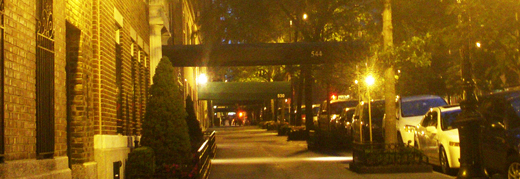Dear Diary: Overstuffed
Monday, August 10th, 2009
Boy, did I overdo it. What I thought would be a Sunday dinner of several courses was instead two Sunday dinners, one served right on top of the other.
As usual, I prepped a chicken for roasting, on Saturday. I spatchcocked it and tucked wads of tarragon butter beneath the skin on the breast. Then I wrapped up the bird in foil and stuck it in the icebox. Everything was set for a normal Sunday dinner. Kathleen and I would eat the legs, and I’d cut up the white meat for salads.
But I had a slightly belated birthday present to give to Fossil Darling, whose principal virtue is his fixed relative antiquity. That is, he is permanently eighteen months older than I am (all right, seventeen). Forever. Unalterably. When were were thrown together at boarding school, eighteen months — or even seventeen — was a significant percentage of my age, more than 10%! So I persist in thinking of Fossil as considerably older. He used to be considerably more mature, but I let that pass. The thing is, I wanted the box out of my house. To make sure that he came and took it away, I offered him dinner. He accepted.
Then I went to the store. My appetite was running to an unseasonable mushroom dish, preferably involving ravioli. This would be the “starch” course. Then I would serve the roast chicken, quartered nicely, and complete each plate with half of a stewed heirloom tomato. Lemon tart to finish. Agata & Valentina was selling packets of good-looking chanterelles, so I bought one and supplemented it with a packet of buttons. I meant to buy a tub of veal stock, but I forgot to, so I stopped in at Gristede’s on the way home and bought a quart of College Inn “sirloin” beef broth — a product that I hadn’t seen before.
I chopped the mushrooms and browned them in batches (having learned this trick, not even knowing that it was one, from Julie & Julia). When the mushrooms were cooked, and had left a nice deposit on the bottom of the sauté pan, I softened a couple of sliced shallots in butter and then deglazed the pan with vermouth. So much for preparation. I returned the mushrooms to the pan and added a cup of the broth. I kept adding more broth as it simmered down, until the box was empty. Then I added a small quantity of cream. Oh! and fresh sage leaves, which I did not cut up, thinking that, like dill, they would hold up through the cooking process well enough to be easily removed when the sauce was finished. (Wrong — but not fatal.)
Only later, after everyone had pushed the chicken disconsolately about the plates, did I realize that the ravioli course contained the business end of a quart of sirloin steak essence. My little ravioli primo would have made a fine dinner by itself, with maybe a little salad afterwards and then perhaps some cheese — and then the tart. Far more interesting than the sequel of roast chicken. Although it was delicious, it competed with the sirloin, and lost. The mushroom-ravioli sauce deep, rich, and complex. It made the chicken routine and — just plain heavy.Â
Another thing that didn’t strike me until later was that it had been a long time since there had been four people dining at the table. The occasion might have been a first for 2009. I’m not saying that I was out of practice. If anything, the time lapse intensified my sense of having cooked far too much food. It wouldn’t have happened if I’d started out, mentally, with the ravioli. I’d never have thought of throwing in a chicken dish as well. But I began with the chicken, and throwing in a pasta dish seemed absolutely normal.
Absolutely normal because I wasn’t really thinking.



















